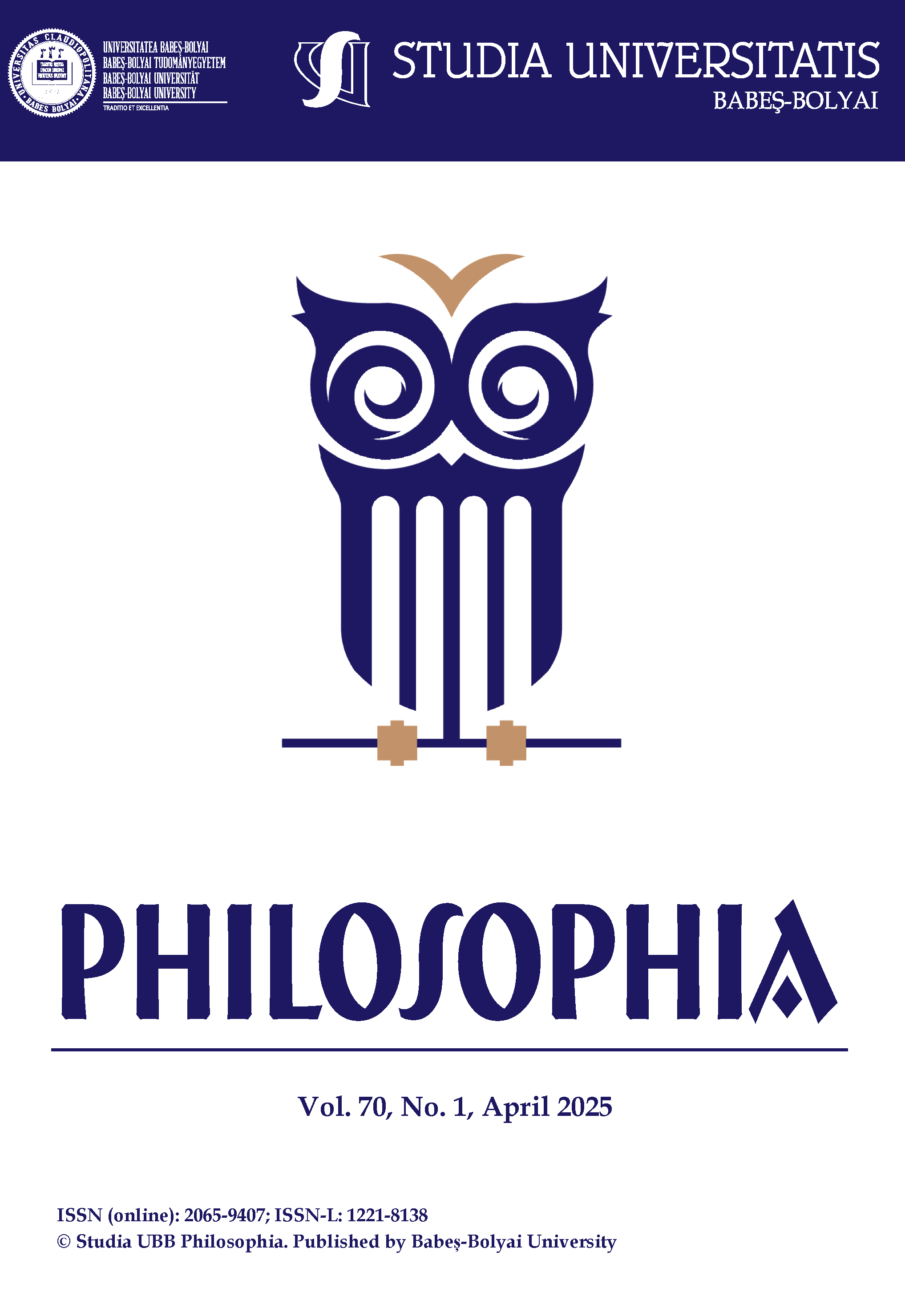Die Verabschiedung des Leibes und seine Wiederkehr. Der cartesische Dualismus in dem Discours und den Meditationes nebst der Skizze einer phänomenologischen Weiterführung der Leib-Seele-Problematik
DOI:
https://doi.org/10.24193/subbphil.2025.1.01Keywords:
soul, body, idea, cogito, image, evidence, Descartes, Schopenhauer, Husserl, HeideggerAbstract
Saying Farewell to the Body and its Comeback. Cartesian Dualism in the Discourse and the Meditationes together with a Sketch of a Phenomenological Continuation of the Body-Soul Problem. There is no independent concept of the soul in Descartes’ Meditationes de Prima Philosophia, nor is there any other argument for its immortality than the possibility of its continued existence after death, thanks to its distinction from the body. This is why the soul and the body must remain in opposition: either thinking or extended, indivisible or divisible substances, ontologically necessary, mathematically ideal or merely confused accidentals suspended on geometrically constructed skeletons. It sems that the division between body and mind has never been so great as in Descartes. However, it is precisely the continuity of his unquestioned knowledge of the ideas/forms and the eternally unchanging nature of mathematical objects, untouched by his methodological doubt, that finds its expression in the idea of evidence: For Descartes, seeing with the eye of the mind is not only possible, but remains the most reliable way of “seeing”. It is precisely evidence that Schopenhauer recovers to restore the world not only as (Cartesian) representation but also as a non-mediated, bodily lived truth: the world as will. It is also evidence that Husserl chose as a methodological starting- and also connecting point to Descartes’ philosophy. With his evidence-based method, one could conclude that Descartes not only remained at the entrance door to transcendental subjectivity (as Husserl stated at the beginning of his Cartesian Meditations) but also locked himself out of examining corporeality: the phenomenologically evident re-entrance for the thinker as a solipsist back to the intersubjectivity of the living world.
References
Alloa, E., Bedorf, T., Grüny, C., Klass, T.N. (Hg.), Leiblichkeit, Tübingen 2012.
Alloa, E. / Depraz,N., Edmund Husserl- „Ein merkwürdig unvollkommen konstituiertes Ding“ in Alloa, E., Bedorf, T., Grüny, C., Klass, T.N. (Hg.), Leiblichkeit, Tübingen 2012, 7-22.
Beckermann, A., Das Leib-Seele-Problem. Eine Einführung in die Philosophie des Geistes, Paderborn 2011.
Betz, G., Descartes‘ »Meditationen« Ein systematischer Kommentar, Stuttgart 2011.
Descartes, R., Discours de la Méthode, Französisch-Deutsch, übers. v. C. Wohlers, Hamburg 2011.
Descartes, R., Meditationes de Prima Philosophia/Meditationen über die Erste Philosophie,
Lateinisch/Deutsch, übers. v. A. Schmidt, Stuttgart 2020.
Hagmann, M., Descartes in der Auffassung durch die Historiker der Philosophie-Zur Geschichte der neuzetlichen Philosophiegeschichte, Winterthur, 1955.
Heidegger M. Wegmarken, Gesamtausgabe Band 9, Frankfurt am Main, 1976.
Heidegger M. Nietzsche, Gesamtausgabe Band 6.1. und Band 6.2, Frankfurt am Main, 1996.
Heidegger M. Nietzsche, Gesamtausgabe Band 6.1. und Band 6.2, Frankfurt am Main, 1997.
Heidegger, M. Zürcher Seminar, Aussprache mit Martin Heidegger am 6. November 1951, Gesamtausgabe Band 15, 425-439.
Heidegger, M. Die Zeit des Weltbildes, in: Holzwege, Gesamtausgabe Band 5, Frankfurt am Main 1977, 75-113.
Heidegger, M, Der Satz vom Grund, Gesamtausgabe Band 10, Frankfurt am Main 1997.
Henry, M., Heidegger, Descartes, Nietzsche. Schopenhauer et le »courant souterrain« de la métaphysique, in: Regehly, T., Schubbe, D. (Hg.), Schopenhauer und die Deutung der Existenz, Stuttgart 2016, 137-146.
Husserl, E. Cartesianische Meditationen, Hamburg 2012.
Kant, I. Von einem neuerdings erhobenen vornehmen Ton in der Philosophie, Schriften zur Metaphysik und Logik 2, Werkausgabe Band VI, Frankfurt am Main 1996, 377-397.
Koch, D. Das schönste Band und die Analogia. Zu Platons»Timaios« 31b-32 c, in: Noveanu, A. Koch, D. Weidtmann, N. (Hg.) Analogie. Zur Aktualität eines philosophischen Schlüsselbegriffs, Baden-Baden 2023, 103-111.
Lehel Markó, Corps et individualite chez Descartes, in Studia universitatis Babeș-Bolyai Philosophia No.1/2009, pp. 111-122.
Niebel, W. F., Horn., A. Schnädelbach, H. (Hg.), Descartes im Diskurs der Neuzeit, Frankfurt am Main, 2000.
Noveanu, A., »Das Wunder schlechthin«. Vom Leibverständnis Shopenhauers zur analogischen Apperzeption in Husserls »V.Cartesianische Meditation«, in: Regehly, T., Schubbe, D. (Hg.), Schopenhauer und die Deutung der Existenz, Stuttgart 2016, 46-65.
Noveanu, A., Erkenntnis, doppelte in: Schubbe, D, Lemanski, J. (Hg.) Schopenhauer-Lexikon, Paderborn 2021, 96-97.
Merleau-Ponty, M. übers. v. Giuliani, R., Waldenfels, B. Das Sichtbare und das Unsichtbare, München 2004.
Platon, Theätet, Griechisch-Deutsch, übers. v. E. Martens, Stuttgart 1981.
Platon, Symposion, Werke Band 3, übers. v. F. Schleiermacher, Darmstadt, 2011.
Platon, Symposion, übers. v. B. Zehnpfennig, Meiner 2000.
Regehly, T., Schubbe, D. (Hg.), Schopenhauer und die Deutung der Existenz, Stuttgart 2016
Schopenhauer, A., Die Welt als Wille und Vorstellung, Sämtliche Werke Band I, Hg. W.Frhr. von Löhneysen, Stuttgart/Frankfurt am Main, 1986.
Schopenhauer, A., Parerga und Paralipomena I, Sämtliche Werke Band IV, Hg. W.Frhr. von Löhneysen, Stuttgart/Frankfurt am Main, 1986.
Schubbe, D, Lemanski, J. (Hg.) Schopenhauer-Lexikon, Paderborn 2021.
Downloads
Published
How to Cite
Issue
Section
License
Copyright (c) 2025 Studia Universitatis Babeș-Bolyai Philosophia

This work is licensed under a Creative Commons Attribution-NonCommercial-NoDerivatives 4.0 International License.



